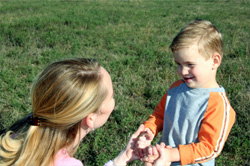
We live in a time of unparalleled wealth. H. David Burton said, "It is hard to say no to more when you can afford to say yes."
Saying no to purchasing another piece of athletic equipment, pair of shoes, or electronic game is precisely what is sometimes needed as we parent our children, difficult to do when happiness seems only dollars away.
Bishop Burton acknowledges the desire we often feel to keep our kids well supplied and outfitted so they can be competitive and achieve their goals. He continues to point out, however, that more is often less.
Emptiness and "Stuff"
Dr. Madeline Levine, a therapist for adolescents in California, wrote about the alarming number of teenagers who come to therapy and describe themselves as "empty."
These are children who are offered lots of opportunities and material goods but lack a healthy sense of who they are.
Dr. Levine describes one teen in particular named Allison. Allison's entire sense of who she was came from what she owned and who was around her. Take these things away, said Dr. Levine, and "Allison's sense of self was thin as air" (44).
Bishop Burton related a story about a young boy named Kenny, who loved to play with his two broken Hot Wheels cars, and whose family was not wealthy. A kind friend of the family gave many models of Hot Wheels to Kenny as a gift. Kenny now owned a large collection of cars. But when the friend visited the family later she noticed that Kenny was staring out the window, not touching the cars. When asked what was wrong Kenny replied, "I'm sorry. . . I guess I just don't know how to love so many Hot Wheels."
"There are times when less is in reality more and times when more can be less. For instance, less pursuit of materialism may enable more family togetherness. More indulgence of children may result in less understanding of life's important values." (98)
Treasure and Heart
How do we create children with a healthy sense of self? In part by not allowing what children own turn into the focus of their lives. "For where your treasure is, there will your heart be also" (Matt. 6:21).
In order to do that we have to live that way as well, practice restraint in what we give ourselves and our children, and show our children that we value eternal relationships and attributes more than our earthly possessions.
Balancing Discussion
Do you feel you are balanced right now in terms of providing materially and giving of yourself and your time to your children? Evaluating with your spouse where you are in terms of providing for your family can be a helpful way to begin giving "more" or "less."
Use Your Judgement
It's usually harder to spend your own money than someone else's, so you might help children find ways to earn their own money in order to teach differences between needs and wants. Encourage them to make "wish lists" and practice restraint with their purchasing as well.
Needs And Wants
You could have Family Home Evenings about needs and wants. Young children enjoy sorting magazine or newspaper clippings of different items into piles labeled "needs" and "wants," which could lead to a healthy discussion about both.
Thinking Out Loud
As you go through the process of evaluating nonessential purchases before you make them, let your children in on it. Have a wish list? Let your kids see you use it: you can easily teach a lesson by making your decision about the new car or the new pair of gloves a dialogue with the kids.
Free Fun
A grandmother said to her granddaughter who was about to get married, "Learn how to have fun for free." This advice could be carried into your family by allowing kids to make lists of "Fun, Free Things to Do." The ideas could become your Family Home Evening activities, helping children learn how easy it is to create your own entertainment.
Tuning In To Ads
Have you ever purchased something you knew you wanted, only to find it days later still in its package because you'd forgotten about it? Much of the time purchases are made because of the emotional reward (advertisers know this: Buy now! Pay later!). You could explain this "emotional reward" to your children and teach them to be aware of the advertising techniques (like products will make you happy, and fear of being different or left out if you don't buy something). You can make games out of identifying the techniques while watching commercials, etc.

William Wordsworth wrote these often quoted words, "The world is too much with us; late and soon, getting and spending, we lay waste our powers." Prophets have long told us to focus first on eternal matters and second on earthly issues.
Helping children focus on eternal matters will help them understand who they are and how to be happy--much more than the newest snowboarding equipment, an extra set of lessons, or outings to the local mall ever will.
When we teach our children about principles like love and kindness and generosity, that's when we can feel good about giving them more, more, more!
Sources
Burton, H. David. "More Holiness Give Me," Ensign, Nov. 2004, 98.
Levine, Madeline. The Price of Privilege. New York: Harper Collins, 2006.
Wordsworth, William. The World is Too Much With Us.